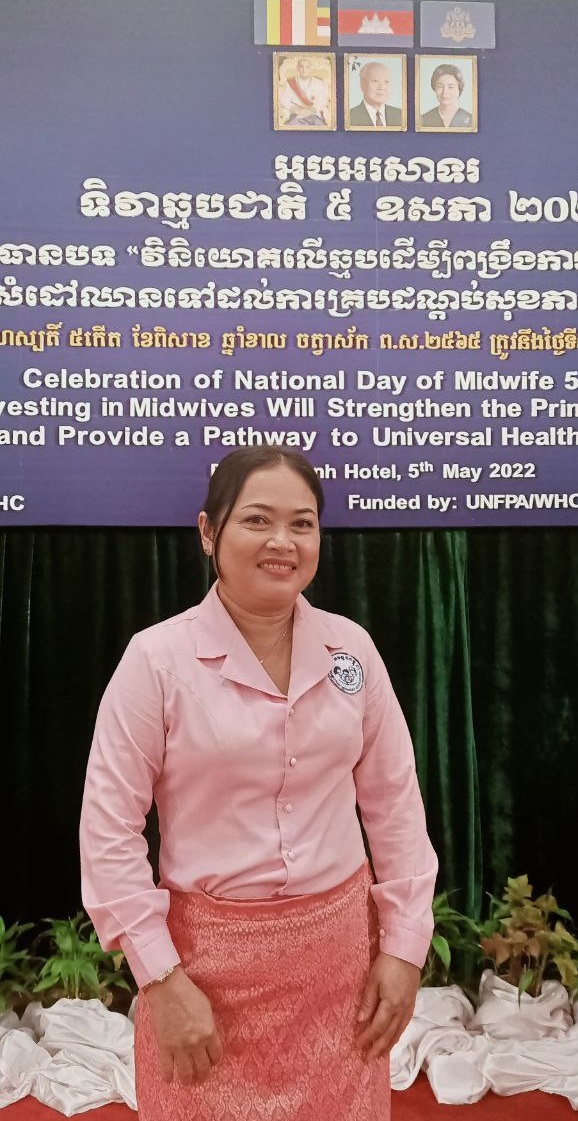To celebrate this International Day of the Midwife, WHO Cambodia would like to share the story of one midwife, to illustrate the challenges and joys to be found in this crucial work. We are pleased to share the thoughts of midwife Ms. Sar Lyna to tell us about her work, and the vital role she plays in her community.
“After finishing high school in Kampong Chhnang province, I decided to apply to a medical school to be a health professional. My uncle encouraged me to apply for the midwifery program at the Technical School for Medical Care (TSMC) in 1993. I chose this profession because I want to be a health worker to serve my people. I also thought that I would spend less time studying than the other degrees because I am an orphan, and I was poor.
I thought that if I could be a midwife, I could get a job because the Ministry of Health needs secondary midwifes to work at the primary health care level, especially at health centres in rural areas of the country. I passed the final exam to become a secondary midwife in 1996. I was then recruited and assigned to be a midwife for the “Taches” health centre named in Kampong Tralach district, Kampong Chhnang province. I was there for two years before I moved to work at the National Maternal and Child Health Centre (NMCHC) hospital in Phnom Penh city.
 Ms. Sar Lyna, midwife.
Ms. Sar Lyna, midwife.
© Sar Lyna
I remember starting my career at Taches health centre, and during that time, the health centre was very different to how it is today. Only a few maternal and child health, immunization and delivery services were available for the population in that area. We lacked everything to provide good quality maternal, newborn and child care for our clients. Now, I am working at the national hospital, so I can build up my capacity to serve more and more women to be safe during pregnancy, delivery and post-delivery.
As a midwife working with the clients and patients, I have faced some challenges such as having limited knowledge in some areas so that I cannot provide good technical answers. Some clients ask me questions that are beyond my capacity as a secondary midwife. A few women's families were difficult to talk to, since they demand from health workers services that differ from the correct medical technique and regulations.
Midwifery is very important because it can reduce maternal and child mortality. It provides scientific health care, counselling and information on prenatal and postnatal health care and contraception for women in general. Midwives play a key role as front-line service providers especially at the primary health care (PHC) level. We provide necessary care to women throughout their reproductive age including pre-pregnancy, during pregnancy, labour and the post-natal period and to care for the newly born infant. Another equally important task of midwifes is health promotion and health education for disease prevention with the aim of improving the health outcomes of individuals, families and communities.
I would like people to know that all midwives work very hard. We work for 24 hours per day, without weekends or holidays because we cannot predict the exact time that a woman will go into the labour. I would like to share my experience of caring for pregnant women during pregnancy, delivery and postpartum with all my midwife colleagues too. Even though I faced many challenges, I have always liked my job as a midwife because I am a woman so I would like to help other women to get antenatal care, a safe delivery at the health centre and continuing post-partum care.”
“On behalf of WHO, I would like to recognise and celebrate all of Cambodia’s midwives, and the hard and valuable work that they do to serve the community” says WHO Representative to Cambodia Dr Li Ailan. WHO works to support the Royal Government and the Ministry of Health by building the capacity of midwives for improving women and children's health to ensure that women and children not only “survive”, but “thrive”, and have the opportunity to develop to their full potential for a better future in Cambodia.
